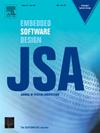Collaborative optimization of offloading and pricing strategies in dynamic MEC system via Stackelberg game
IF 4.1
2区 计算机科学
Q1 COMPUTER SCIENCE, HARDWARE & ARCHITECTURE
引用次数: 0
Abstract
The rapid advancement of 5G technology has indirectly propelled the growth of connected devices within the Internet of Things (IoT). Within the IoT domain, mobile edge computing (MEC) has demonstrated potential in task processing. However, as computational services expand, the reliable determination of user offloading strategies and the rational establishment of service prices offered by servers to users continue to present challenging research directions. The primary focus of this paper revolves around task offloading in the MEC system, encompassing numerous user terminal devices that support energy harvesting (EH), a MEC server and a central cloud server. The optimization goals are to maximize the utilities for both users and the MEC server by adjusting offloading and pricing strategies. To guarantee the task queue’s stability within the system and achieve a reasonable allocation of system resources, we propose a dynamic task offloading approach rooted in Lyapunov optimization theory and Stackelberg game theory. In this algorithm, the MEC server takes on the role of the leader, while each user terminal device acts as the follower. Aiming at the game equilibrium existence of the algorithm, a series of mathematical analysis is carried out. Additionally, we conduct extensive simulation experiments to validate the proposed algorithm’s effectiveness. The proposed algorithm achieves improvements in user utility, with a 6.43% increase compared to the average time-constrained task offloading (ATCTO) scheme, a 61.80% improvement over the local-only processing (LOP) scheme, and a 23.97% enhancement over the genetic algorithm (GA) scheme. Meanwhile, it achieves a task queue backlog reduction of 50.00% compared to ATCTO, 70.00% compared to LOP and 15.28% compared to GA.
基于Stackelberg博弈的动态MEC系统卸载与定价策略协同优化
5G技术的快速发展间接推动了物联网(IoT)中连接设备的增长。在物联网领域,移动边缘计算(MEC)在任务处理方面已经展示了潜力。然而,随着计算服务的扩展,可靠地确定用户卸载策略和合理地确定服务器向用户提供的服务价格仍然是具有挑战性的研究方向。本文的主要重点是围绕MEC系统中的任务卸载,包括支持能量收集(EH)的众多用户终端设备,MEC服务器和中央云服务器。优化目标是通过调整卸载和定价策略来最大化用户和MEC服务器的效用。为了保证系统内任务队列的稳定性,实现系统资源的合理分配,我们提出了一种基于Lyapunov优化理论和Stackelberg博弈论的动态任务卸载方法。在该算法中,MEC服务器扮演领导者的角色,而每个用户终端设备扮演追随者的角色。针对该算法的博弈均衡存在性,进行了一系列的数学分析。此外,我们进行了大量的仿真实验来验证所提出算法的有效性。与平均时间约束任务卸载(ATCTO)方案相比,该算法提高了6.43%,比local-only processing (LOP)方案提高了61.80%,比遗传算法(GA)方案提高了23.97%。同时,与ATCTO相比,它的任务队列积压减少了50.00%,与LOP相比减少了70.00%,与GA相比减少了15.28%。
本文章由计算机程序翻译,如有差异,请以英文原文为准。
求助全文
约1分钟内获得全文
求助全文
来源期刊

Journal of Systems Architecture
工程技术-计算机:硬件
CiteScore
8.70
自引率
15.60%
发文量
226
审稿时长
46 days
期刊介绍:
The Journal of Systems Architecture: Embedded Software Design (JSA) is a journal covering all design and architectural aspects related to embedded systems and software. It ranges from the microarchitecture level via the system software level up to the application-specific architecture level. Aspects such as real-time systems, operating systems, FPGA programming, programming languages, communications (limited to analysis and the software stack), mobile systems, parallel and distributed architectures as well as additional subjects in the computer and system architecture area will fall within the scope of this journal. Technology will not be a main focus, but its use and relevance to particular designs will be. Case studies are welcome but must contribute more than just a design for a particular piece of software.
Design automation of such systems including methodologies, techniques and tools for their design as well as novel designs of software components fall within the scope of this journal. Novel applications that use embedded systems are also central in this journal. While hardware is not a part of this journal hardware/software co-design methods that consider interplay between software and hardware components with and emphasis on software are also relevant here.
 求助内容:
求助内容: 应助结果提醒方式:
应助结果提醒方式:


